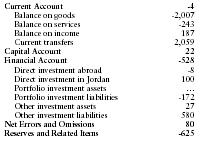Jordan - Balance of payments
Jordan's chronically adverse trade balance has long been offset by payments from foreign governments and agencies, especially from Jordan's oil-rich Arab allies, and by remittances from Jordanians working abroad, chiefly in Sa'udi Arabia. During the Gulf War, expatriate remittances and aid from Arab countries dropped sharply, causing the improvement of the trade deficit to halt. This trend continued into the mid-1990s despite an increasing surplus in the services sector. Although Jordan enjoyed a balance of payments surplus in 2000 of around 11% of GDP, the country suffers from a chronic trade deficit, largely due to its reliance on foreign oil. Annual imports usually amount to more than double the exports.
The US Central Intelligence Agency (CIA) reports that in 2002 the purchasing power parity of Jordan's exports was $2.5 billion while imports totaled $4.4 billion resulting in a trade deficit of $1.9 billion.
The International Monetary Fund (IMF) reports that in 2001 Jordan had exports of goods totaling $2.3 billion and imports totaling $4.3 billion. The services credit totaled $1.48 billion and debit $1.73 billion. The following table summarizes Jordan's balance of payments as reported by the IMF for 2001 in millions of US dollars.

| Current Account | -4 |
| Balance on goods | -2,007 |
| Balance on services | -243 |
| Balance on income | 187 |
| Current transfers | 2,059 |
| Capital Account | 22 |
| Financial Account | -528 |
| Direct investment abroad | -8 |
| Direct investment in Jordan | 100 |
| Portfolio investment assets | … |
| Portfolio investment liabilities | -172 |
| Other investment assets | 27 |
| Other investment liabilities | 580 |
| Net Errors and Omissions | 80 |
| Reserves and Related Items | -625 |
Comment about this article, ask questions, or add new information about this topic: